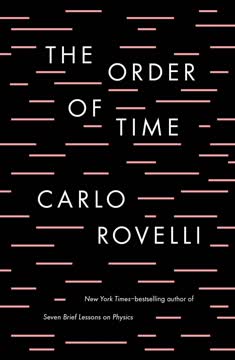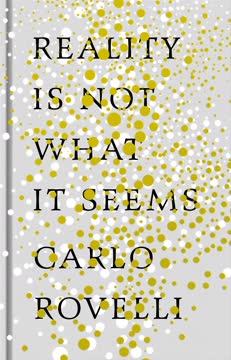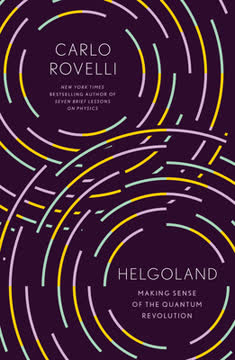Key Takeaways
1. Time is not universal, but relative and variable
There is no single time: there is a different duration for every trajectory; and time passes at different rhythms according to place and according to speed.
Time is relative. Einstein's theory of relativity revealed that time is not a fixed, universal constant. Instead, it varies based on factors such as gravity and velocity. For example:
- Time passes more slowly near massive objects due to gravitational time dilation
- Time moves more slowly for objects traveling at high speeds due to special relativity
- Clocks on satellites orbiting Earth tick slightly faster than those on the ground
This means that the passage of time is not uniform throughout the universe. Two observers in different reference frames may experience time differently, challenging our intuitive understanding of a single, universal "now."
2. The present moment is not a universal concept
A present that is common throughout the whole universe does not exist. Events are not ordered in pasts, presents, and futures; they are only "partially" ordered.
The "now" is local. The idea of a universal present moment across the entire universe is an illusion. In reality:
- The present is a localized phenomenon, extending only to our immediate surroundings
- Events that appear simultaneous to one observer may not be simultaneous to another
- The concept of "now" breaks down at cosmic scales due to the finite speed of light
This realization fundamentally changes our understanding of the universe's structure. Instead of a series of universal "now" moments, we have a complex web of partially ordered events, interconnected but without a single, objective timeline.
3. Past and future distinction emerges from entropy
The entire difference between past and future may be attributed solely to the fact that the entropy of the world was low in the past.
Entropy defines time's arrow. The distinction between past and future is not inherent in the fundamental laws of physics, which are time-symmetric. Instead, it emerges from the statistical behavior of large systems, governed by the second law of thermodynamics. Key points:
- Entropy, a measure of disorder, tends to increase over time
- The past appears more ordered (lower entropy) than the future
- This asymmetry gives rise to our perception of time's direction
The arrow of time we experience is thus a consequence of the universe's initial low-entropy state, rather than a fundamental property of reality itself.
4. The world is made of events, not things
The world is not a collection of things, it is a collection of events.
Reality is processual. Our intuitive view of the world as composed of enduring objects is an approximation. At a deeper level, reality consists of interconnected events and processes. This shift in perspective has profound implications:
- Objects are better understood as long-lasting events or processes
- The fundamental constituents of reality are interactions, not static entities
- This view aligns better with modern physics, including quantum mechanics and relativity
Embracing this event-based ontology helps reconcile our everyday experience with the counterintuitive insights of contemporary science, providing a more accurate picture of the universe's nature.
5. Time emerges from our perspective and interactions
Perhaps the flow of time is not a characteristic of the universe: like the rotation of the heavens, it is due to the particular perspective that we have from our corner of it.
Time is perspectival. The flow of time as we experience it may not be an intrinsic feature of the universe, but rather an emergent phenomenon arising from our particular viewpoint and interactions with the world. Consider:
- Our perception of time is shaped by the specific physical systems we are part of
- The direction of time may be related to our limited, "blurred" view of reality
- Time could be analogous to other perspectival phenomena, like the apparent rotation of the sky
This suggests that our experience of time's flow is not a universal truth, but a consequence of our position within the cosmos and the nature of our interactions with it.
6. Memory and anticipation shape our experience of time
We are histories of ourselves, narratives. I am my thoughts full of the traces of the phrases that I am writing; I am my mother's caresses, and the serene kindness with which my father calmly guided me; I am my adolescent travels; I am what my reading has deposited in layers in my mind; I am my loves, my moments of despair, my friendships, what I've written, what I've heard; the faces engraved on my memory.
Time is woven into our identity. Our experience of time is intimately connected to our sense of self, shaped by memory and anticipation. This interplay creates our subjective sense of temporal continuity:
- Memory allows us to construct a narrative of our past
- Anticipation enables us to project ourselves into potential futures
- The interplay between past, present, and future creates our sense of ongoing identity
This perspective highlights how deeply time is embedded in our consciousness and self-perception, suggesting that our experience of time is as much a psychological phenomenon as a physical one.
7. Entropy drives the universe, not energy
It is entropy, not energy, that keeps stones on the ground and the world turning.
Entropy is the cosmic engine. While we often think of energy as the driving force of the universe, it's actually the increase in entropy that propels cosmic evolution and everyday phenomena. Key insights:
- Energy is conserved, but entropy always increases in closed systems
- The flow from low to high entropy enables processes and changes in the universe
- Even simple phenomena like objects falling are ultimately driven by entropy increase
This perspective shift helps explain why the universe evolves and changes over time, despite the conservation of energy, and underscores the fundamental role of entropy in shaping reality.
8. Our identity is shaped by memory and temporal perspective
We are processes, events, composite and limited in space and time. But if we are not an individual entity, what is it that founds our identity and its unity?
Identity is dynamic. Our sense of self is not a fixed, unchanging essence, but a dynamic process shaped by our experience of time and memory. This view of identity has several implications:
- We are more like stories or narratives than static entities
- Our identity is continually reconstructed through memory and anticipation
- Our sense of self emerges from our interactions with the world and others
This understanding of identity as a temporal process aligns with both modern psychology and the event-based ontology of contemporary physics, offering a more nuanced view of what it means to be a person.
9. Time may be an effect of our limited perception
Time has loosened into a network of relations that no longer holds together as a coherent canvas.
Time's coherence is illusory. Our everyday experience of time as a smooth, continuous flow may be an artifact of our limited perception. At a fundamental level, time appears to be:
- A complex network of relations between events
- Not a single, universal dimension but a multitude of local phenomena
- Possibly emergent from quantum-level interactions and our macroscopic perspective
This suggests that our intuitive understanding of time may be a useful approximation rather than an accurate reflection of reality's underlying structure.
10. Understanding time leads us back to ourselves
To understand ourselves means to reflect on time. But to understand time we need to reflect on ourselves.
Time and self are intertwined. The quest to understand the nature of time ultimately leads us to examine our own consciousness and perception. This circular relationship reveals:
- Our experience of time is deeply connected to our sense of self
- Understanding time requires us to consider how we, as conscious beings, interact with the world
- The study of time bridges physics, philosophy, and psychology
This insight suggests that a complete understanding of time may require not just physics, but a holistic approach that includes the study of consciousness and human experience.
Last updated:
FAQ
What's "The Order of Time" by Carlo Rovelli about?
- Exploration of Time: "The Order of Time" delves into the nature of time, challenging our conventional understanding and exploring its complexities through the lens of modern physics.
- Scientific Perspective: Rovelli uses concepts from quantum mechanics and relativity to explain how time is not a single, uniform entity but a complex web of events and interactions.
- Philosophical Inquiry: The book also addresses philosophical questions about time, such as its relation to human perception and consciousness.
- Emergence of Time: Rovelli discusses how time emerges from a timeless universe, focusing on the role of entropy and the observer's perspective.
Why should I read "The Order of Time"?
- Deepen Understanding: It offers a profound insight into one of the most fundamental aspects of our universe, challenging and expanding your understanding of time.
- Interdisciplinary Approach: The book combines physics, philosophy, and literature, making it accessible and engaging for readers from various backgrounds.
- Thought-Provoking: Rovelli's exploration of time encourages readers to question their perceptions and consider the broader implications of scientific discoveries.
- Engaging Writing: Rovelli's clear and poetic writing style makes complex scientific concepts understandable and enjoyable.
What are the key takeaways of "The Order of Time"?
- Time is Not Absolute: Time is not a single, universal flow but varies depending on speed and gravity, as shown by Einstein's theories.
- Entropy and Time's Arrow: The direction of time, or the "arrow of time," is linked to the increase of entropy, which is a measure of disorder.
- Time and Human Perception: Our experience of time is deeply connected to memory and anticipation, making it subjective and personal.
- Emergence from Simplicity: Time as we know it emerges from a more fundamental, timeless reality, shaped by our interactions and observations.
How does Carlo Rovelli explain the concept of time in "The Order of Time"?
- Relativity and Time: Rovelli explains that time is relative, influenced by factors like speed and gravity, which can cause it to flow at different rates.
- Quantum Mechanics: He discusses how quantum mechanics introduces uncertainty and granularity to time, challenging the notion of a continuous flow.
- Thermal Time Hypothesis: Rovelli introduces the idea that time emerges from thermodynamic processes, with entropy playing a crucial role.
- Subjective Experience: He emphasizes that our perception of time is shaped by our brain's processing of memories and expectations.
What is the "thermal time hypothesis" in "The Order of Time"?
- Emergent Time Concept: The thermal time hypothesis suggests that time emerges from the thermodynamic properties of systems, particularly through entropy.
- Entropy's Role: Entropy, a measure of disorder, increases over time, providing a direction or "arrow" to time's flow.
- Macroscopic Perspective: This concept highlights that time is not fundamental but arises from the macroscopic states of systems.
- Blurring and Ignorance: Our limited knowledge and blurred perception of the universe contribute to the emergence of time as we experience it.
How does "The Order of Time" relate time to human perception and consciousness?
- Memory and Anticipation: Rovelli argues that our sense of time is deeply tied to memory and anticipation, which are functions of the brain.
- Subjective Experience: Time is experienced subjectively, with our consciousness creating a narrative that links past, present, and future.
- Temporal Illusions: The book suggests that many aspects of time, such as its flow and direction, are illusions created by our perception.
- Philosophical Implications: Rovelli explores philosophical questions about the nature of time and its connection to human identity and existence.
What are the implications of time being relative, as discussed in "The Order of Time"?
- Variable Flow: Time does not flow uniformly; it can speed up or slow down depending on factors like gravity and velocity.
- No Universal Present: There is no single "now" that applies universally; what is present for one observer may not be for another.
- Impact on Physics: This relativity of time challenges traditional physics and requires new ways of understanding the universe.
- Human Experience: Our everyday experience of time is an approximation, influenced by our specific conditions and limitations.
How does Carlo Rovelli address the concept of entropy in "The Order of Time"?
- Entropy and Time's Arrow: Rovelli explains that the increase of entropy gives time its direction, distinguishing past from future.
- Statistical Nature: Entropy is a statistical measure of disorder, and its increase is a fundamental aspect of thermodynamics.
- Emergence of Time: The concept of entropy is central to the emergence of time from a timeless universe, as it provides a framework for understanding change.
- Perspective and Blurring: Our perception of entropy and time is influenced by the blurring of details and our limited perspective.
What role does quantum mechanics play in "The Order of Time"?
- Granularity of Time: Quantum mechanics introduces the idea that time is not continuous but consists of discrete "quanta."
- Indeterminacy: The uncertainty inherent in quantum mechanics challenges the notion of a fixed, predictable flow of time.
- Relational Aspect: Rovelli discusses how quantum mechanics suggests that time is relational, depending on interactions between systems.
- Fundamental Level: At the most fundamental level, time as we know it may not exist, replaced by a network of events and interactions.
What are the philosophical questions about time explored in "The Order of Time"?
- Nature of Reality: Rovelli questions whether time is a fundamental aspect of reality or a construct of human perception.
- Existence of the Present: The book explores whether the present is a meaningful concept in a universe without a universal "now."
- Time and Identity: Rovelli examines how our understanding of time is linked to our sense of self and consciousness.
- Illusion of Flow: The book challenges the idea that time flows in a linear, unidirectional manner, suggesting it may be an illusion.
What are the best quotes from "The Order of Time" and what do they mean?
- "Perhaps time is the greatest mystery." This quote encapsulates the central theme of the book, highlighting the complexity and enigmatic nature of time.
- "Time is ignorance." Rovelli suggests that our perception of time is a result of our limited understanding and blurred vision of the universe.
- "We are time." This quote emphasizes the idea that our identity and consciousness are deeply intertwined with our experience of time.
- "The world is not a collection of things, it is a collection of events." Rovelli challenges the traditional view of a static universe, proposing a dynamic, event-driven perspective.
How does "The Order of Time" challenge traditional views of time?
- Non-Uniform Flow: The book argues against the idea of a single, uniform flow of time, presenting it as variable and relative.
- No Absolute Present: Rovelli challenges the notion of a universal present, suggesting that time is localized and subjective.
- Emergent Property: Time is presented as an emergent property, not a fundamental aspect of the universe, arising from thermodynamic processes.
- Philosophical Reinterpretation: The book encourages a philosophical reevaluation of time, questioning its role in reality and human perception.
Review Summary
The Order of Time explores the nature of time through physics and philosophy. Rovelli challenges common perceptions, arguing that time is relative and possibly illusory. He discusses concepts like entropy, quantum gravity, and the absence of a universal "now." Many readers found the book beautifully written and mind-expanding, praising Rovelli's ability to explain complex ideas. Some struggled with the more technical sections. Overall, the book was widely appreciated for its poetic approach to science and its thought-provoking insights, though a few critics found it confusing or disagreed with Rovelli's conclusions.
Similar Books



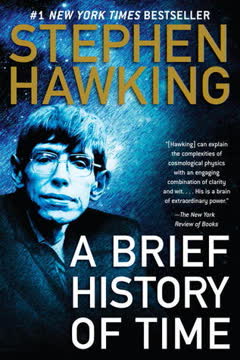
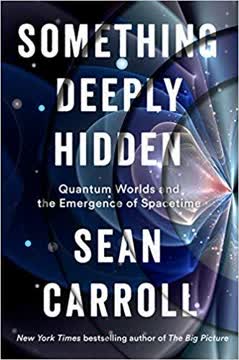


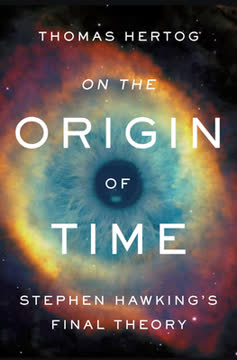
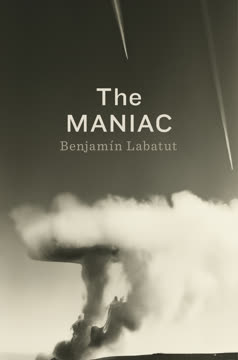

Download PDF
Download EPUB
.epub digital book format is ideal for reading ebooks on phones, tablets, and e-readers.
